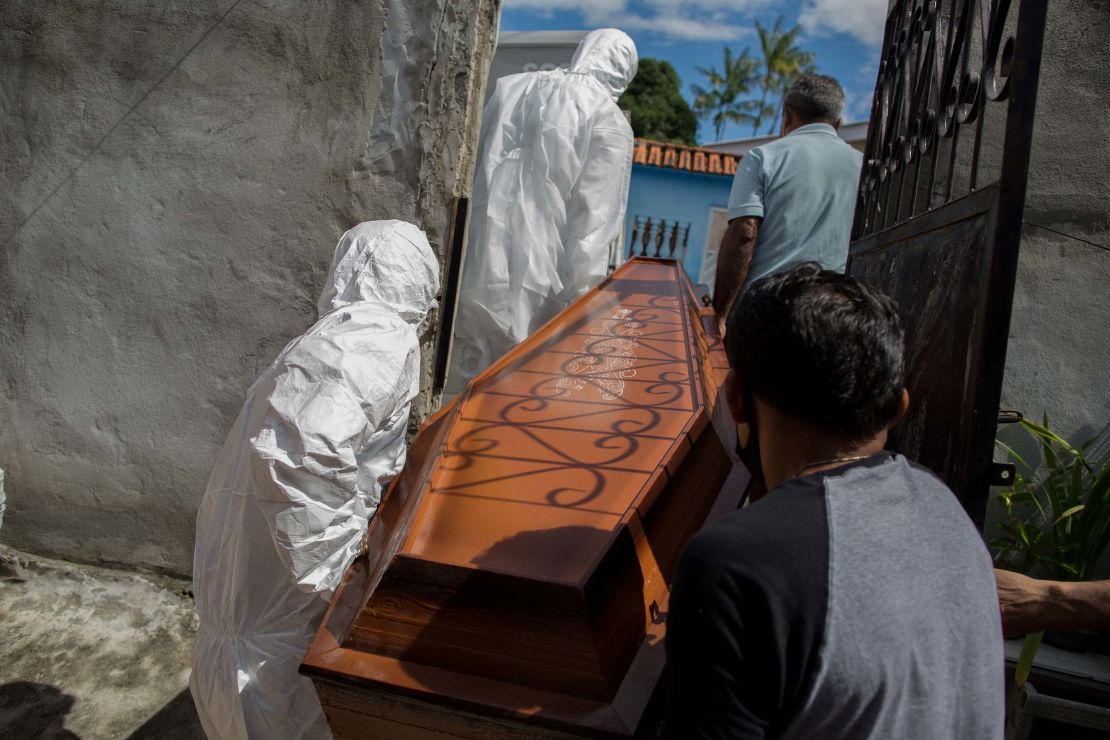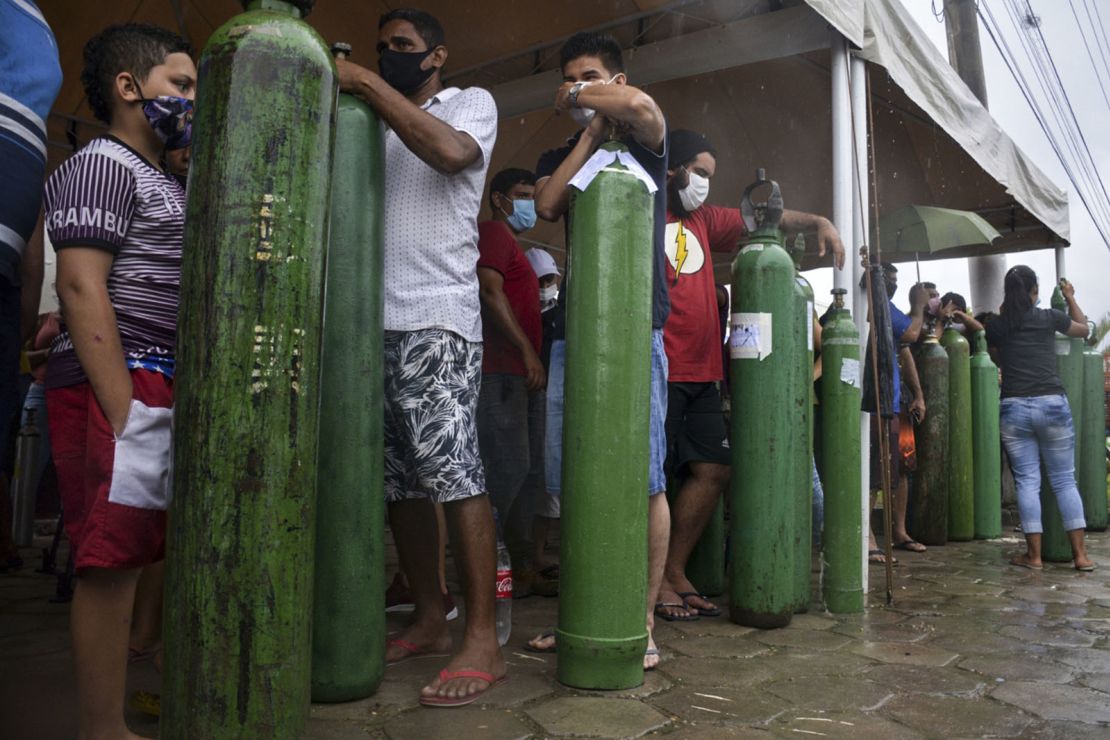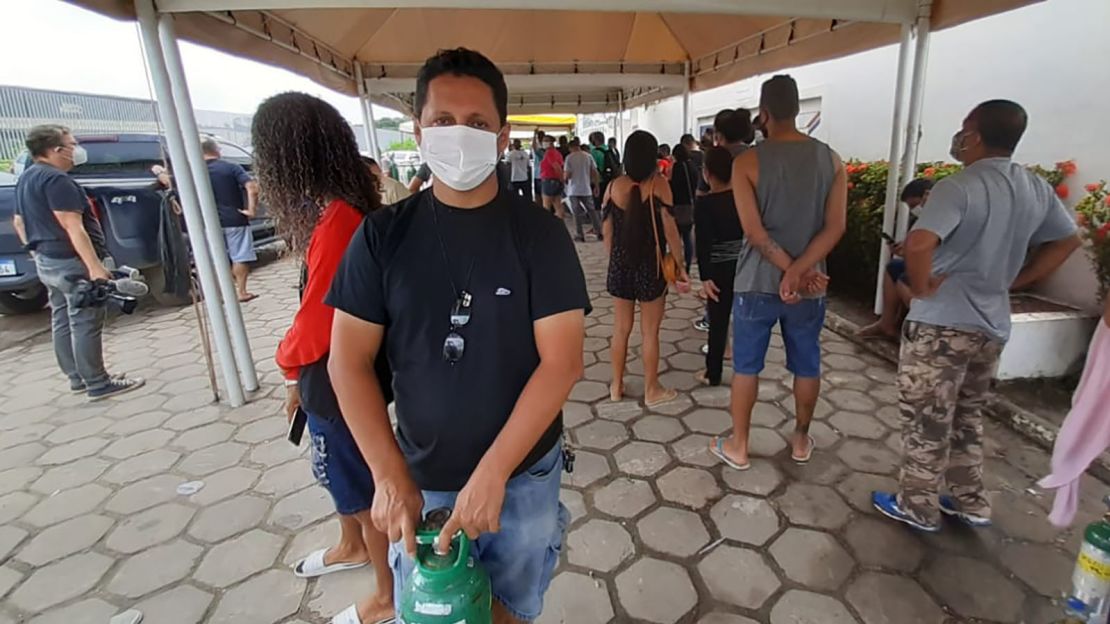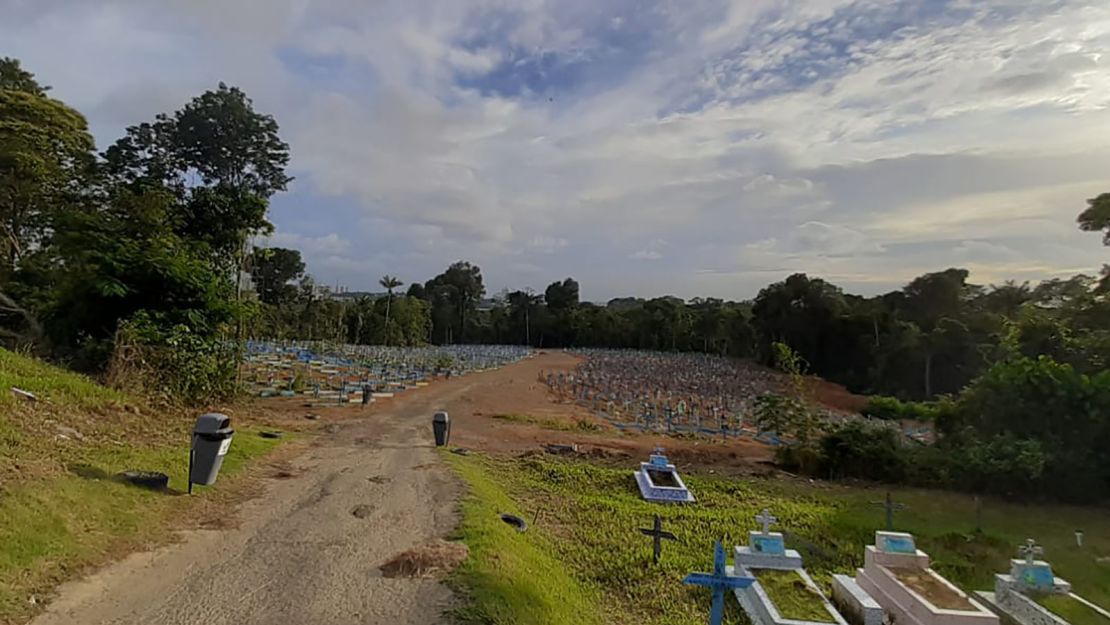It’s waiting hours in line to buy an oxygen tank – only to find there’s none left. For some, it’s rushing from hospital to hospital with a sick spouse or parent – only to find there are no beds available. For others, it’s waiting outside of hospitals for news of a loved one – only to hear they could not be saved.
For the medical workers, it’s frantic 36-hour shifts. For the gravediggers, it’s moving the tons of dirt required to create 20,000 more graves.
For the dead, it’s the “vertical” burial, with bodies stacked atop each other in the increasingly crowded cemeteries of Manaus, Brazil.
This is the heartbreak of a city whose health care system has collapsed. And it isn’t the first time — in less than a year, this isolated city at the core of the Brazilian rainforest is witnessing its second coronavirus wave, a shock to the many who thought its first wave was so widespread that herd immunity must be the result.

Missed warnings
Manaus is the capital and largest city in the state of Amazonas. It has over 30 public and private hospitals, catering to numerous remote indigenous and small communities around the area. But the logistics of getting there – and supplying those hospitals – can be complicated. With road connections limited, most approaches to the city are by air or river.
The coronavirus first tore through Manaus like wildfire in April 2020, creating such a vast surge of cases that scientists speculated it might result in herd immunity. Politicians seized on the idea, hopeful they would be able to avoid economically damaging lockdowns in the future.
But in September 2020, the Oswaldo Cruz Foundation (Fiocruz), a highly regarded Brazilian research institute for public health, recommended that the city impose movement and business restrictions. Manaus was beginning to experience a second wave of the disease, it said. But the city did not impose one.
“We gave 13 alerts, and a very alarming one in mid-December, saying that the situation was getting very serious. Everyone was making fun of the studies and warnings, especially the President Jair Bolsonaro,” says Jesem Orellana, researcher at Fiocruz.
Orellana adds that both the state and federal government used the theory of herd immunity to back up their relaxed measures. “They all talked about herd immunity, and an environment was created for this discourse to crystallize, and the measures to relax. That feeling may have been responsible for this relaxation of people’s behavior.”
A few months later, by late December, the surging number of recorded Covid-19 deaths and cases in Manaus was undeniable. Amazonas state governor Wilson Lima acquiesced to expert advice, announcing new lockdown measures. But these were fiercely denounced by protesters who echoed Brazilian Bolsonaro’s urging to keep the country’s economy running. Lima quickly backed down and celebrations rang.
In an exclusive interview with CNN, Manaus mayor David Almeida now blames those protest gatherings and unfettered year-end celebrations for the current spike in cases, which has brought the city to a total of over 248,000 cases and more than 7,050 deaths.
“We are paying the price for this disobedience, these protests from the end of last year. A lot of people need to be held accountable for this,” said Almeida, who took office earlier this month. “During the New Year celebrations, it was precisely the party promoters who were the vectors for this transmission, this propagation and this rise in cases.”
Starting Monday, the state of Amazonas will now go into a seven-day lockdown.

Running out of oxygen
By early January, it became clear that the city was on the verge of running out of oxygen – critical for patients with severe cases of Covid-19.
A company named White Martins, which supplied hospitals in Manaus with oxygen, emailed officials from both Amazonas state and the federal Health Ministry by January 8, warning that shortages loomed, according to a report by Brazil’s Solicitor General.
Health Minister Eduardo Pazuello visited Manaus January 11, and the federal government sent supplemental oxygen on January 12 – but it was not enough.
According to the attorney general’s report, Pazuello also encouraged medical professionals to adopt a supposed “early treatment” kit against Covid-19 that combines drugs including hydroxychloroquine and ivermectin – neither of which have been proven as effective treatments for Covid-19. He has since denied doing this.
The day after his departure, a crisis exploded. Just as predicted, oxygen shortages pushed the city’s healthcare system into collapse last week, forcing authorities to airlift patients to other states. Local media described patients dying of asphyxiation. Preliminary numbers released by the Federal Prosecutor’s Office, which is investigating the crisis, attribute 29 deaths so far due to the oxygen shortages. That number is expected to increase as the investigation continues.
“The reality is that there’s a lower supply of oxygen,” Pazuello acknowledged later. “Not an interruption, but a lower supply of oxygen.”
The shortages persist today. Last week, CNN counted around 40 people in line to buy or replace oxygen cylinders from one private supplier, some frustrated, others anxious.
“There was no preparation from the state for this new surge,” Joseney Costa Vicente, 49, told CNN as he tried to buy oxygen for his mother, who is 69 and has tested positive for Covid-19. He spent 16 hours in a hospital with no oxygen or medical attention, he says, before the family decided to care for her at home.
“It makes me angry. We feel really upset and outraged with this whole situation.”

Eliane Rodrigues, 49, says at times she’s had to wait more than 12 hours to buy oxygen. Everyone in her house has tested positive for Covid-19, and her mother, 71, is in the worst shape.
Fatigued and stressed as they are, many believe it’s better to care for the sick at home than send them to a hospital.
“We don’t trust the government,” Rodrigues says, fearing having to take her mother to a hospital. “We’re afraid there will be more death than life there.”
Hospitals remain stretched to the limit. Over 530 people are still waiting for a hospital bed, according to the Amazonas State Health Secretary.
CNN visited three hospitals that said they could accept no more patients. People waited outside frantically hoping to find space to hospitalize their loved ones, some screaming and crying.
At one hospital’s doors, staff and a security guard worked to ensure that no one entered without authorization, but were unable to provide even basic information to panicked relatives waiting for updates on patients.
Waiting outside, Amanda da Silva Monteiro told CNN that no one had been able to locate her father, 71, for two days since his hospitalization with Covid-19.
“My dad is a working man. I have the right to know if he’s alive or dead,” da Silva Monteiro told CNN. “Every day we’re here but they don’t give us any information.”
Investigations and finger-pointing
Who is responsible for letting this lethal crisis boil over? Unpreparedness and political upheaval have been blamed for the current situation in Manaus. A clear disconnect between the local and federal governments has also created turmoil since the pandemic began last year.
The office of General Prosecutor Augusto Aras has called for an investigation into the Health Ministry’s response to warnings about Manaus’ oxygen shortages, as well as investigations into Amazonas state governor Lima, former Manaus mayor Arthur Virgilio Neto and current mayor Almeida.
But the federal government rejects responsibility for allowing oxygen shortages to reach such critical lows – and blames the government of Amazonas state instead. Brazil’s vice president Hamilton Mour?o said earlier this month that – despite multiple warnings from scientists – there was no way to predict the collapse of Manaus’ health system. Pazuello himself denies that his ministry failed to act effectively, and Bolsonaro has accused the state government of mismanaging federal funds.
The Amazonas state government, in turn, has blamed the logistical challenges of rapidly resupplying this isolated city. On Sunday, the State Health Department told CNN that it was making “every effort, with the assistance of the Federal Government, to address the difficulties encountered in the oxygen supply logistics,” including deploying planes, helicopters and speedboats loaded with more oxygen cylinders.
For his part, Almeida says the city government is not responsible for the current crisis. Though all hospitals have been overrun with Covid-19 cases, he notes that city-run hospitals did not suffer as extreme oxygen shortages as state hospitals.
His month in office “feels more like a year,” he adds.
A recipe for catastrophe
Amazonas state authorities say they will soon open two more hospitals, one with federal support, to increase the city’s available bedcount. Pazuello, the Health Minister, has returned to Manaus and this time, he will stay “as long as necessary” to get the city’s health system back on track, he says.
But many Manaus residents have little confidence left in authorities to respond to the coronavirus – and emerging variants of the virus pose additional levels of complication and potential threat.
Luan Matos de Menezes, a 26-year-old ICU doctor, describes what he sees today as an even worse version of what the city suffered last year.
“What’s happening is really serious. You can tell that patients’ conditions are much more critical than in the first wave. It’s much more grave than in other parts of the country. The deaths are much quicker. The number of serious infections is much higher than in the first wave, and the patients are younger.” says Menezes.
“Yesterday I had a 24-year-old guy die in my ICU. I’ve got patients who are 32 and 29. Young patients who are in very critical condition.”

Tired and frustrated, Matos de Menezes says he blames both authorities and the Manaus community for failing to learn last year’s lessons, and for clinging to unproven theories instead of following scientific recommendation.
“So you have a community that thinks it’s safe based on a false (theory of) herd immunity and based on ineffective medicines for Covid-19, in addition to a new variant that is more transmissible and more serious that is circulating in the community… You had the recipe to make this catastrophe happen.”
And at every level, Brazilian officials failed to take preventative action in time, he concludes, attributing the slow response to a reluctance to damage the economy.
“A vaccine that starts off late, a lockdown that started late. Done in the name of a God that is called money, in the name of shop owners’ greed, in the name of businessmen’s greed. Until they realize that they are going to get sick and there won’t be a place to get treatment here and money won’t buy life.”
Correction: This story has been updated to clarify that Amazonas state will lock down for seven days on Monday, instead of ten.
Marcia Reverdosa reported from Manaus, Brazil. CNN’s Taylor Barnes and journalists Rodrigo Pedroso and Eduardo Duwe contributed to this report.





